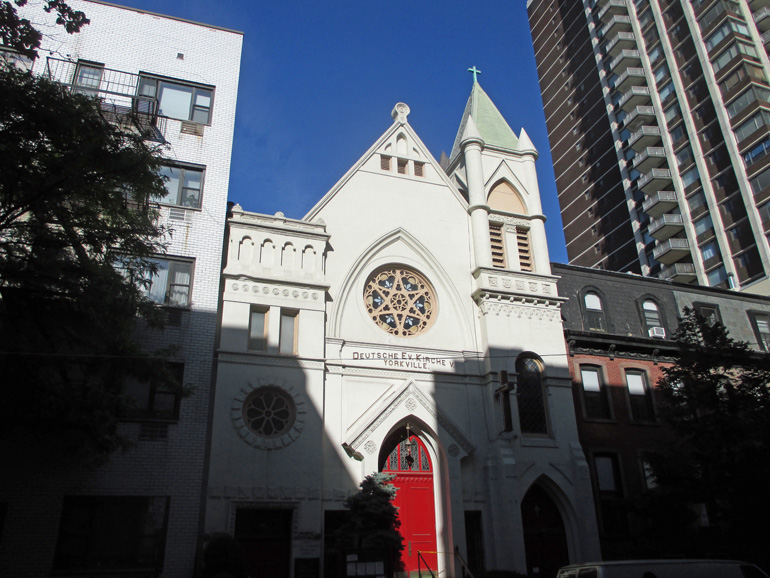Gotham Diary:
Colleges
November 2017 (I)
Tuesday, October 31st, 2017
31 October; 1 and 2 November
Tuesday 31st October
What is the life of the mind? No, I mean really. I’m tempted sometimes to call it a mirage, a hope or a dream that is never to be realized. But the very word “mirage” tips me off to the real disenchantment: I’m upset that there are no ivory towers, no secure retreats in which sense can be made of the world. There is only my apartment, which is quiet enough but occupied by an unruly refrigerator and dozens of small housekeeping problems. It seems to me that most people who have pursued the life of the mind have been in a position to overlook domestic distractions, so it would be plausible to attribute my shortcomings in the mind department to my not being in that position.
But the question persists: what is the life of the mind? What does it look like, feel like? What is it good for? Can any reasonably smart person have a go at it? Or is it a vocation? If it is, who’s doing the calling?
What is an “intellectual”? What does an intellectual do? Lead the life of the mind, or something else? Are intellectuals born or made? How smart does an intellectual have to be?
***
These questions buzz incessantly because they are unanswerable. It’s not up to me, or to any one other person to answer them; there has to be consensus, just as there is a consensus about who is and who is not an electrical engineer. Most of us don’t have a very clear idea of what it is that electrical engineers do, and we certainly don’t know what electrical engineers know, but we trust them to stake out their territory and to keep it in order. And so it is with other professions. Am I suggesting that the life of the mind is a profession? Don’t look at me. There seems to be a widespread notion that intellectuals spend their time being intellectuals, whatever that means. If that’s what they’re doing with their days, then it looks like a profession to me. If some people think that the life of the mind is a profession, do we want to persuade them otherwise? I gather that people who believe in the existence of professional intellectuals do not think very highly of the life of the mind.
All I know is how to make it even worse. “Intellectual” is vague. “Critic” is not. Nobody likes to be criticized. But I can tell you’re getting bored. Let’s talk about rapists. There’s a piece about rapists in the Times today. Well, that’s not what they called themselves. They denied that they were rapists, although they acknowledged forcing themselves upon unconsenting women.
Most subjects in these studies freely acknowledge non-consensual sex — but that does not mean they consider it real rape. Researchers encounter this contradiction again and again.
Asked “if they had penetrated against their consent,” said Dr. Koss, the subject will say yes. Asked if he did “something like rape,” the answer is almost always no.
Studies of incarcerated rapists — even men who admit to keeping sex slaves in conflict zones — find a similar disconnect. It’s not that they deny sexual assault happens; it’s just that the crime is committed by the monster over there.
And this is not a sign that the respondents are psychopaths, said Dr. Hamby, the journal editor. It’s a sign that they are human. “No one thinks they are a bad guy,” she said.
Indeed, experts note one last trait shared by men who have raped: they do not believe they are the problem.
I like this story, because it illustrates the need for critics. No one thinks they are a bad guy. You probably assume — I’m addressing men here — that if you raped someone, you’d at least know that you’d done so, but, no, that’s not how it works, apparently. You might admit, as some of them men described in the story did, that you were paying back someone for arousing you — a sort of quid pro quo thing, not rape. You would make use of a handy disconnect to distance doing a bad thing from being a bad person.
The story also illustrates the difficulty of the critic’s job, which is precisely to identify and disable all those disconnects. And the problem is not limited to convincing these men that, no, they are rapists, they have raped. The odds are that, if you gathered the families of these men and confronted them with the record, they, too, would deny that their husband or son or father or uncle was a rapist. Is the critic, to do the critic’s job, suppose to insist that nobody can leave the room until everyone accepts the truth?
And what is the truth? We create an abstraction, non-consensual coitus, say (this would only be one kind of rape), and use it as a frame. If someone’s behavior puts him in the frame, then we cut away all the irrelevant details and shove him into the pen of rapists. By simplifying things, we make it possible to impose a uniform punishment. But of course no details are irrelevant to the people living them. I don’t mean to plead extenuating circumstances, but only to point out that nobody sees himself as an abstraction. In the heat of the moment, nobody sees much of anything.
It may be argued that, for this very reason, sexual misbehavior is not a good test of critical purposes. I would reply that, where social institutions are concerned, the problem is even worse. Sex offenders do seem to know that they’ve done something wrong. Institutional grandees — politicians, CEOs, university presidents — carry on as if they were not only good guys but great guys, on top of everything and in complete command of all necessary skills. As if the protocols of leadership had been established for centuries, as if the conduct of public affairs were as straightforward as driving a car. In fact, as any critic can see, we muddle in a mist. Our traditions are largely bogus and our arrangements are undermined by secret agendas. The effectiveness of our reforms is monstrously exaggerated. We consistently blame problems on their victims, because, after all, if the victims disappeared, there would be no problems, right?
We use disconnects, too. We “forget” what we have done as a society. History is stuff that happened on the other side of a gulf of timelessness, or once upon a time. Life is now! Help yourself to a clean slate!
There’s plenty to keep a critic busy. The life of the mind is not one of idle relaxation!
***
Wednesday 1st November
When I was a boy, formality was on the way out, but it was still very much a part of life, at least in my upper-middle-class corner of the world. Boys bowed slightly and girls curtsied when shaking hands. You said, not “Thank you,” but “Thank you, Miss Smith.” Thank-you notes were a trial. Everyone hated formality, not because it was tedious or onerous, although it could be both of those things, but because it was felt to be meaningless, an empty hangover of olden days. If children hated it the most, that was because we could see how doomed it was, and how pointless it was for us to learn the ins and outs. We felt about formality pretty much what children sitting in a van parked beside a beach think about adults who are slow to open the doors and let them run to the fun.
The world was going casual. Comfort, not status, was the new criterion. Ease replaced attentiveness. Intimacy could develop as quickly as two people wanted it to. And women were going to be as free as men — someday.
And now we know what that looks like. The world is everybody’s living room. Or perhaps it would be more accurate to say that the world is everybody’s hotel room.
***
Most people in Europe and America today are the descendants of men and women who were peasants and small farmers in the Eighteenth Century and earlier. In the past two hundred years, we have all come up in the world, and, as is always the case with upward mobility, we have had to learn how to behave like our immediate betters. There have been many steps on the ascent, not just one or two, and each one has involved mastering a slightly different code of manners. I think it fair to say that very little reflection was ever involved. It was like learning a dance. You watch the dancers who are good at it and try to follow their steps. You don’t ask why.
Well, some people asked why. Two hundred years of incessant “improvement,” of picking up new ways of doing things only to replace them with more desirable ways, inevitably produced a feeling of rootlessness, a worry that all this good behavior might not guarantee access to a genuinely superior way of life. As early as the 1820s, Transcendentalists were protesting against “conformity.” In the middle of the century, Flaubert mordantly ridiculed the aspirations of the bourgeoisie. What the many forms of modernism had in common was a rejection of polite conventions, whether by consulting psychotherapists or drinking cocktails in the middle of the day.
So, by the time of my boyhood — the years of glorious new prosperity for everybody — the jig was up. Keeping up with the Joneses would henceforth take on a brutally materialistic aspect. The Joneses might set the standard for cars, household appliances, and lawn care, but nobody cared anymore how they behaved at home. Now that social status could be established in terms of chrome (in) and crabgrass (out), there was no need to put on an act. You could be yourself, and risk spontaneity. The only rule of behavior in America was that you ought to be “nice.”
***
The great unmourned casualty of this new freedom from formality was “respectability.” I don’t think that young people have any idea of what this meant, much less of how vitally important it was as a foundation of feminism. To put things very briefly, respectability was a code of conduct that allowed middle-class women who followed it assiduously to move with relative freedom outside the home without bringing dishonor upon themselves or their families. If we tend to associate the preoccupation with female chastity with non-Western cultures, that is because centuries of respectable women weaned us from the idea that a woman alone in public will inevitably inspire sexual improprieties. A side effect of this long experience was the creation of a parallel zone of private conduct, stretching between married fidelity and outright adultery, in which unattached men and women might pursue intimacy tentatively and with impunity, but until the middle of the Twentieth Century, this was a secret — the woman was punished if she was caught. But it was a secret that eventually made the public routines of respectability look ridiculous.
It would be foolish to suggest that a return to the norms of respectability would provide today’s women with increased protection from sexual harassment and assault, and in any case such returns are never possible. The motive behind respectability — the apparently universal need to assure and to be assured of female chastity — has largely evaporated, and only religious primitives in the West are concerned about it. Our current concern is for the autonomy and safety of women. But I think it worthwhile to consider aspects of respectability that might be put to new use.
Respectability was always extra-legal; its authority was drawn from the community of women. The ostracism of “fallen” women is well-known, thanks to La Traviata and the domestic life of George Eliot, but it should not be forgotten that men were disciplined, too. A man who made improper advances — among which we might class invitations to hotel rooms for any ostensible purpose — would be denied entry to respectable homes, thus making it impossible for him to contract a respectable marriage. In the court of respectability, a woman’s complaint weighed more than a man’s defense, and men took great care to avoid the appearance of impropriety. In today’s terms, a man of dubious sexual integrity might find the path to career advancement blocked. I go so far as to wonder if the concerted effort to police laddish misconduct might be a more effective propellant through the glass ceiling than mere individual ambition.
Desire being what it is, these efforts would provoke a fair amount of hypocrisy, and women would have to forego the delirium of sudden intimacy. But it would be men, now, and not women, who would have to prove themselves to be respectable.
***
In Jane Austen’s novels, there is a good deal of tension and humor about the use of proper names between young men and women. In two novels, Sense and Sensibility and Mansfield Park, ambiguous extensions of the family circle allow the use of Christian names long before the milepost of engagement has been reached, creating circumstances in which familial intimacy leads to marital intimacy. And in Emma, much the same point is made in the opposite way by the heroine’s decision to go on calling the man she loves “Mr Knightley”; switching to “George” would be a move away from intimacy. But these instances are small exceptions to the vast authority of a correct usage that judged undue familiarity to be insolent and insulting. Something else to think upon.
***
Thursday 2nd
Richard Hofstadter’s Anti-Intellectualism in American Life is a long book — much longer than its pages. Its perspective is immense, and, arguably, could be neither wider nor deeper. For it is really the history of a nation’s unwillingness and inability to reflect. The United States was founded on a Constitution in which the most advanced political theories of the Enlightenment were distilled, but within little more than a generation, its swelling population of backwoodsmen and immigrants regarded higher education with mistrust. Outside enclaves clustered in the Northeast, everyday life was crude and boisterous. The prohibition of established religion, far from encouraging a secular society, readily accommodated every variety of confessional caprice. Promoters, developers, and industrialists either single-mindedly or mindlessly pursued profits. For most of its first century, the United States was preoccupied by a bonanza of exploitation, punctuated by an appallingly bloody war that ended in exhaustion and without a significant victory. The main lesson of American history seems to be that no right is more cherished than the right to be stupid.
(Just how stupid, even I hadn’t guessed. Many of the yeoman farmers who figured in Jefferson’s agrarian dreams were ignorant of the rudiments of working the land; Hofstadter reminds us that their descendants mounted stiff resistance to the expertise offered by the land-grant universities. The trail of the pioneers was a desolation of despoiled acres.)
At the outset, Hofstadter expresses concern about “wounding the national amour-propre,” but that is something that I have never felt. Anti-Intellectualism in American Life didn’t tell me anything I didn’t know, anything I hadn’t lived through; it simply supported my conclusions with a wealth of corroborative evidence. Two sentences on, Hofstadter writes,
For all their bragging and their hypersensitivity, Americans are, if not the most self-critical, at least the most anxiously self-conscious people in the world, forever concerned about the inadequacy of something or other — their national morality, their national culture, their national purpose. (vii)
But, perhaps because self-consciousness is the trigger, Americans prefer to feel, rather than to think, their way through the questions that trouble them. Thinking is a matter of honestly asking those questions, and discriminating among the possible answers. Feeling is afraid of questions, precisely because they open on to the frightening unknown. Feeling finds its answers ready-made, packaged in the form of sentiment. Sentiment combines a picture of how things ought to be with an attitude of hostility toward other pictures. Anyone who thinks about the matter recognizes that a statue of Jefferson Davis must be offensive to all Americans. A sentimental response to the same statue is likely to hold that, since the statue has been standing for a long time, it ought to go on standing. (Of course, there is an alternative path of thought: the statue should stand because the idea of America is false.)
Living in America means getting used to living with people who mistake feeling for thinking. This is the number-one problem of democracy, and it is no longer confined to the United States. We simply have more experience with it. For a long time, people who believed in thinking — let’s call them intellectuals — professed feelings of alienation from their fellow-citizens. Alienation was still a big deal when I was growing up; it was the hallmark of a hipster. Now it just seems a silly pose, when it is not actually a mental disorder.
Perhaps the alienation is situational rather than personal. Hofstadter was inclined to believe that the American intellectual’s position is a tragic one, “either shut out or sold out.” (417) This assumes that the intellectual seeks to participate in the exercise of power. I have somewhat tentatively concluded that the intellectual has nothing to offer the public but persuasion. The intellectual who becomes an expert, at the public service, has in essence ceased to be an intellectual, at least with regard to the area of expertise; for no one consults an expert to hear his questions.
One question that Hofstadter leaves unanswered is the nature of the intellectual’s venue. Whatever it is that intellectuals do, where should they do it? Princeton’s Institute for Advanced Study seems one answer to me, but I don’t know very much about it. I’ve always dreamed of Colleges, handsomely endowed institutions, rather like those artistic retreats such as Yaddo and the MacDowell Colony, only permanent, and not necessarily residential. I try not to imagine the Colleges in any detail, because to do so would tie me up making imaginary arrangements that would guarantee me a place in one. But aside from a nice income, membership would provide introductions to other intellectuals. As Hofstadter suggests, intellectuals work best in solitude. But you still have to keep up.
Bon week-end à tous!





